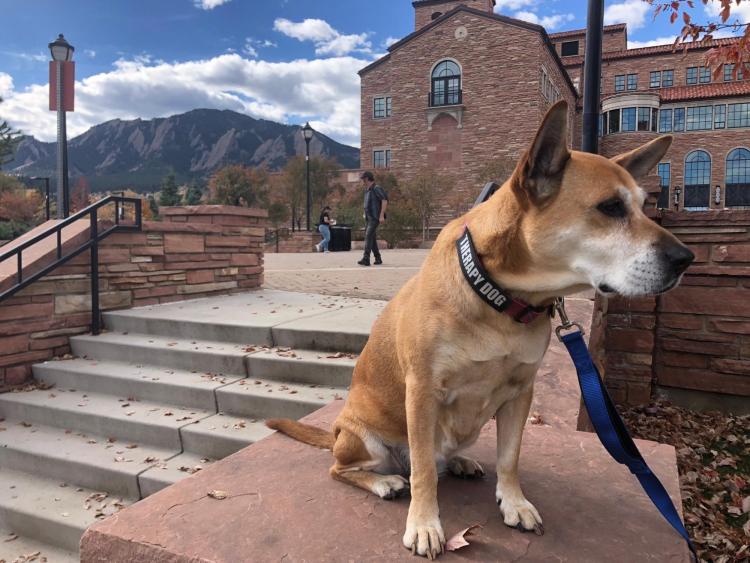Reducing stress with a wag, a woof and a nuzzle: Therapy dogs on campus

On a cloudy fall day, on one of the most beautiful college campuses in the country, a biscuit-colored dog with oversize ears, bushy eyebrows and a compact build sits atop a slab of Colorado pink sandstone, soaking up views of the Flatirons, nearby red-tiled roofs, and dry leaves skittering across manicured lawns.
In her dark eyes is a steady gaze that belies the hurdles she has cleared. Abandoned at a shelter with her eight puppies a decade ago, she survived a car crash and a serious hip injury, fought her way through a painful rehabilitation, and escaped euthanasia after rescuers recognized her unflagging spirit.
Bell has earned the right to stay home and rest. Instead, she will serve as one of two recruits for CU Boulder’s new student canine therapy program. The program, spearheaded by the Division of Student Affairs’ Counseling and Psychiatric Services (CAPS), launched this fall in time for finals preparation.
“We share Bell’s story to inspire and help students who have gone through trauma,” said CAPS Director Monica Ng. “Dogs make people feel secure and safe.”
Integrating canines into therapy sessions is one of several new health and wellness initiatives the division is rolling out this year and next to accommodate increased student demand for mental health services, said Jennifer McDuffie, assistant vice chancellor for health and wellness.
“We are seeing unprecedented demand for services that can help students navigate the challenges of college life, especially among those who are living away from home for the first time,” McDuffie said. “New students arrive on college campuses today facing pressures that previous generations could not have predicted.”
In fact, student anxiety and stress today are more likely to be linked to tech use and the bare-all, always on/always connected culture that has evolved alongside mobile devices. Family crises, health issues, addictions, academic pressures, and worries over the environment, the political landscape and economic disparities can add even more layers of stress to students’ lives.
“This is one of the most important issues facing college students today, and we want to support health and wellness of the mind and body so they can achieve their fullest potential,” McDuffie said. “Our goal is to give them the tools they can use now and in the future to succeed in life.”
Bell and her canine co-worker Toby, a 2-year-old golden doodle, will work with students who are experiencing anxiety and depression or are overcoming pain and trauma, helping them to share their stories with counselors and peers.
Bell’s human companion said the 11-year-old pup is “slowing down a bit, but always seems to recognize when someone could use some comfort.”
Toby, who was born in North Carolina, moved to Colorado recently and summited his first 14er not long ago.

“He loves being around humans. He is here to remind them how wonderful they are and to make them smile when they are sad,” said his human companion, who is also a CAPS staff member.
About 30 percent of American college campuses provide canine therapy to students who—separated from home, hearth and family pets—respond well to the calming effect of soft fur coats, soulful eyes and wagging tails. The medical benefits of human-canine interactions are well-documented, too, with health benefits such as stress reduction and lower blood pressure among them, Ng said.
Independently owned therapy dogs have drawn the attention of students in the past. Last fall, Student Conduct and Conflict Resolution kicked off an inaugural Stay and Play Dog Café on Norlin Quad that drew hundreds of students who sat on rugs and visited with pups while learning about conflict resolution.
CAPS therapists can request the presence of a canine companion during sessions if a student asks for it and the therapist believes such an interaction would be clinically appropriate.
CAPS staff members who volunteer their dogs for canine therapy service are required to fill out an onboarding application showing that their pup has gone through certified obedience training, has had shots (renewable each year) and is hypoallergenic. Dogs must be at least a year old and should have the right personality to work with students, displaying calmness and an ability to adjust easily to new situations or stimuli. While on active duty, they must wear a tag or vest to identify them as therapy dogs.
In return for their hard work, Bell and Toby are allowed several play breaks during the day on campus.
“Everyone goes through bumps in life, through difficult times, but we don’t have to let that define who we are. Because of what Bell has gone through, she has been able to bring that perspective in, to tell that story,” Ng said. “Sometimes, scars make us more special.”


